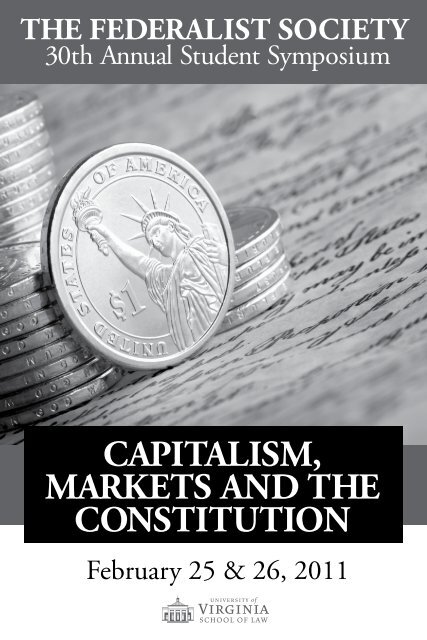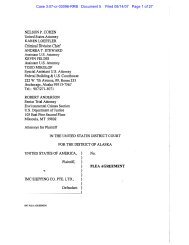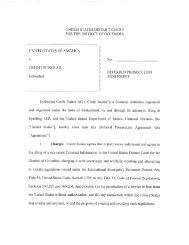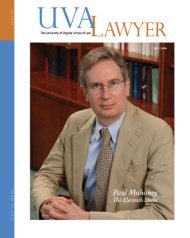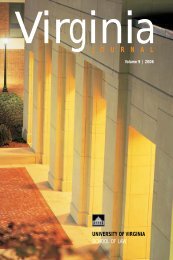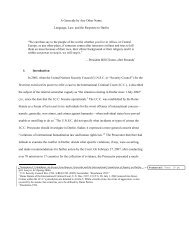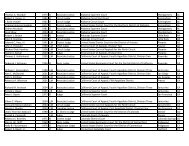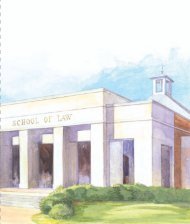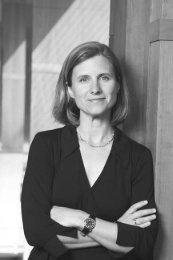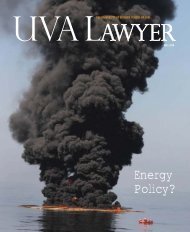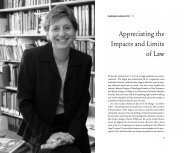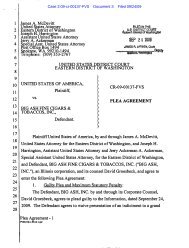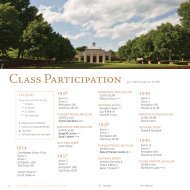CAPITALISM, MARKETS AND THE CONSTITUTION - University of ...
CAPITALISM, MARKETS AND THE CONSTITUTION - University of ...
CAPITALISM, MARKETS AND THE CONSTITUTION - University of ...
You also want an ePaper? Increase the reach of your titles
YUMPU automatically turns print PDFs into web optimized ePapers that Google loves.
<strong>THE</strong> FEDERALIST SOCIETY30th Annual Student SymposiumFebruary 27, 2009J.B. Moore Society <strong>of</strong> International Law<strong>CAPITALISM</strong>,<strong>MARKETS</strong> <strong>AND</strong> <strong>THE</strong><strong>CONSTITUTION</strong>February 25 & 26, 2011
WelcomeAmerica’s economy, characterized bycapitalism and the free market, has generallyprovided material prosperity for its citizenssince the country was founded. In the last fewyears, however, that same economy has faceda financial crisis and recession worse than anyother since the Great Depression. The federalgovernment took an active role in respondingto the downturn, favoring more interventionover less. The results included a bailout <strong>of</strong>major banks and automobile companies, an$800 billion stimulus package, an overhaul<strong>of</strong> financial regulations, and a comprehensivehealth care reform package.These measures were hotly contested,and a vocal group <strong>of</strong> citizens responded byforming Tea Party groups across the country.Members <strong>of</strong> this movement placed a heavyemphasis on the ideas <strong>of</strong> the founders andthe original meaning <strong>of</strong> the Constitution.Opposition to the federal government’seconomic approach, primarily led by the TeaParty movement, culminated in historicRepublican gains in the 2010 midterm elections.Shortly after taking control, the newmajority held a reading <strong>of</strong> the Constitution onthe floor <strong>of</strong> the House <strong>of</strong> Representatives forthe first time in history.The battle over the government’s rolein economic regulation has not only beenwaged in the halls <strong>of</strong> Congress, but in thecourts as well. In the past year a total <strong>of</strong> 28states have filed joint or individual lawsuitschallenging the constitutionality <strong>of</strong> the healthcare reform bill’s individual mandate.With the state <strong>of</strong> the economy at ahistoric low and the popularity <strong>of</strong> the Constitutionat a historic high, now is an apt time toexamine the topic <strong>of</strong> capitalism, markets andthe Constitution. This symposium seeks toexplore the following questions: What werethe economic theories <strong>of</strong> the founders andhow did they influence the Constitution? Towhat extent does the Constitution protecteconomic liberties, if at all? What effectdoes American federalism, embodied in theConstitution, have on the substance and style<strong>of</strong> government regulation? Is a welfare stateconsistent with American exceptionalism?What is the role <strong>of</strong> the courts in times <strong>of</strong>economic uncertainty? And lastly, what werethe causes and consequences <strong>of</strong> the recentfinancial crisis?The <strong>University</strong> <strong>of</strong> Virginia School <strong>of</strong>Law and its Federalist Society chapter arehonored to host the 2011 Student Symposium.The setting is the perfect match for thissymposium — a law school with a history <strong>of</strong>focusing on the intersection <strong>of</strong> law and theeconomy located just miles from the home<strong>of</strong> James Madison. We hope that each <strong>of</strong> youwill approach our panels with an open mindand insightful questions and will discuss witheach other what you learn over the course <strong>of</strong>the weekend. Anyone who has attended pastFederalist Society symposia knows to expectthe highest degree <strong>of</strong> respectful and cordialdebate. Thank you for joining us in Charlottesvillefor what is sure to be an exciting andengaging event.Symposium Committee<strong>University</strong> <strong>of</strong> Virginia Federalist SocietyPlease see the last page <strong>of</strong> this program for alist <strong>of</strong> our generous sponsors.2
Friday3:30 p.m.Registration<strong>University</strong> <strong>of</strong> Virginia School <strong>of</strong> Law,Caplin Auditorium Lobby6:15 p.m.Welcome andOpening Remarks<strong>University</strong> <strong>of</strong> Virginia School <strong>of</strong> Law,Caplin AuditoriumBen MasseyPresident, <strong>University</strong> <strong>of</strong> VirginiaFederalist SocietyLILLIAN BEVIERDean, <strong>University</strong> <strong>of</strong> Virginia School <strong>of</strong> Law6:30 p.m.Debate: EconomicFreedoms and theConstitution<strong>University</strong> <strong>of</strong> Virginia School <strong>of</strong> Law,Caplin AuditoriumSince West Coast Hotel Co. v. Parrish and theend <strong>of</strong> the Lochner era, the Supreme Courthas adhered to the belief that “[t]he Constitutiondoes not speak <strong>of</strong> freedom <strong>of</strong> contract.”But is this commitment consistent with anoriginal understanding <strong>of</strong> the Constitution?This panel will address whether the Constitutionpermits the extensive state regulation<strong>of</strong> economic affairs. Even if Lochner as adecision was illegitimate, has the SupremeCourt retreated too far in protecting economicliberties from state interference? Is theConstitution a thoroughly libertarian documentor is it compatible with a high degree <strong>of</strong>state regulation? Does either understandingcome with any limiting principles? If so, whatare their sources? In any event, is it desirablefor a constitution to constrain the power <strong>of</strong>the state in the area <strong>of</strong> redistribution andeconomic regulation?Randy BarnettGeorgetown <strong>University</strong> Law CenterJeffrey RosenGeorge Washington <strong>University</strong> Law SchoolModerator:Judge Debra LivingstonU.S. Court <strong>of</strong> Appeals for the Second CircuitDebate participant biographies on page 94
11 a.m.SPEECH: The U.S.Financial Crisis: Causesand Consequences<strong>University</strong> <strong>of</strong> Virginia School <strong>of</strong> Law,Caplin Auditorium12:30 p.m.lunch<strong>University</strong> <strong>of</strong> Virginia School <strong>of</strong> Law,Withers-Brown HallMany politicians have blamed business forthe current recession, leading to additionalmeasures by the U.S. government to regulatethe market. Some critics argue that the FederalReserve’s missteps in managing the monetarysystem created an economic bubble. Thatbubble pervaded the real estate market in partthrough relaxed lending standards promulgatedby the government-sponsored enterprisesFreddie Mac and Fannie Mae. When the bubbleinevitably deflated, the crisis spread to thegeneral economy, resulting in high unemploymentand negative or slow economic growth.But will the measures the government took tostem the crisis and regulate the market reduceeconomic growth in the long term? JohnAllison will outline the fundamental economicand philosophical solutions to these problemsin his presentation.John AllisonFormer Chairman and CEO, BB&T CorporationIntroductionHoward HusockManhattan InstituteAllison and Husock biographies on page 157
2 p.m.Panel III: The Welfare Stateand American Exceptionalism<strong>University</strong> <strong>of</strong> Virginia School <strong>of</strong> Law,Caplin AuditoriumFollowing the recent passage <strong>of</strong> PresidentBarack Obama’s health care legislation, thispanel will reassess whether it is possible tohave a welfare state that meshes with theAmerican constitutional tradition. Is theenduring presence <strong>of</strong> government entitlementsantithetical to our system <strong>of</strong> government, or isthere a way to accommodate these programswithout changing the historical Americanrelationship between the individual and thegovernment? Will the growing role <strong>of</strong> governmentin the United States cause the countryto increasingly mirror Europe, or can thenation chart an alternate course? Does the U.S.Constitution’s relative lack <strong>of</strong> positive rightscompared to its counterparts around the worldpose problems for proponents <strong>of</strong> an Americanwelfare state? Is the American suspicion towardstate entitlements the product <strong>of</strong> a longstandingphilosophical commitment or the result<strong>of</strong> historical contingency? Are there currentlyany constitutional limits on the growth <strong>of</strong> thewelfare state? Should there be?William P. Marshall<strong>University</strong> <strong>of</strong> North Carolina School <strong>of</strong> LawJeremy RabkinGeorge Mason <strong>University</strong> School <strong>of</strong> LawNeomi RaoGeorge Mason <strong>University</strong> School <strong>of</strong> LawModerator:Judge Brett KavanaughU.S. Court <strong>of</strong> Appeals for the D.C. CircuitPanel III participant biographies on page 164 p.m.Panel IV: EconomicUncertainty and the Role<strong>of</strong> the Courts<strong>University</strong> <strong>of</strong> Virginia School <strong>of</strong> Law,Caplin AuditoriumThis panel will examine the role <strong>of</strong> the courtsin an uncertain economic climate. Given thefinancial troubles plaguing the United States,how much emphasis should the judiciary placeon the constitutional protection <strong>of</strong> privateproperty? In a difficult economic climate,should a judge’s empathy for those in financialdistress affect his rulings? If a state defaults onits obligations, what is the appropriate role <strong>of</strong>the courts? Should a refusal to pay constitute aviolation <strong>of</strong> the Takings Clause? On a broaderlevel, to what extent do interpretive methodshave financial consequences? How muchstock do investors put in stability in judicialreasoning when choosing where to place theirmoney? Does our current law protect privateproperty too much or not enough to maximizesocial utility, and should that be the standardby which we judge the legal protection <strong>of</strong>property rights? Does the experience <strong>of</strong> othercountries <strong>of</strong>fer any lessons in this area?Paul G. MahoneyDean, <strong>University</strong> <strong>of</strong> Virginia School <strong>of</strong> LawPaul Stephan<strong>University</strong> <strong>of</strong> Virginia School <strong>of</strong> LawTodd ZywickiGeorge Mason <strong>University</strong> School <strong>of</strong> LawModerator:Judge Diane SykesU.S. Court <strong>of</strong> Appeals for the Seventh CircuitPanel IV participant biographies on page 188
participants6 p.m.Cocktail ReceptionBoar’s Head Inn7 p.m.Banquet and KeynoteSpeechBoar’s Head InnInvocationFr. Luke ClarkSt. Thomas Aquinas ChurchIntroduction and WelcomeEugene MeyerPresident, The Federalist SocietyAlexander CoxSymposium Chair, <strong>University</strong> <strong>of</strong> VirginiaFederalist SocietyPresentation <strong>of</strong> Student Chapter AwardsStudent Division Staff, The Federalist SocietyPresentation <strong>of</strong> the Paul M. Bator AwardPresenter:Joseph Bingham<strong>University</strong> <strong>of</strong> Chicago Federalist SocietyRecipient:Brian FitzpatrickVanderbilt <strong>University</strong> Law SchoolIntroduction <strong>of</strong> Keynote SpeakerLillian BeVier<strong>University</strong> <strong>of</strong> Virginia School <strong>of</strong> LawKeynote Speechjustice Clarence ThomasU.S. Supreme CourtDebate: EconomicFreedoms and theConstitutionFriday, 6:30 p.m., Caplin AuditoriumRandy BarnettRandy E. Barnett is the CarmackWaterhouse Pr<strong>of</strong>essor <strong>of</strong>Legal Theory at the Georgetown<strong>University</strong> Law Center,where he teaches constitutionallaw and contracts. Aftergraduating from Northwestern <strong>University</strong> andHarvard Law School, he tried many felonycases as a prosecutor in the Cook CountyState’s Attorney’s Office in Chicago. He hasbeen a visiting pr<strong>of</strong>essor at Northwesternand Harvard Law School. In 2008, he wasawarded a Guggenheim Fellowship inConstitutional Studies. Barnett’s publicationsinclude more than 90 articles and reviews,as well as nine books, including “Restoringthe Lost Constitution: The Presumption<strong>of</strong> Liberty” (Princeton, 2004), “ConstitutionalLaw: Cases in Context” (Aspen, 2008),“Contracts” (Oxford Introductions to U.S.Law, 2010), “Contracts: Cases and Doctrine”(Aspen, 4th ed. 2008) and “The Structure<strong>of</strong> Liberty: Justice and the Rule <strong>of</strong> Law”(Oxford, 1998). In 2004, Barnett argued themedical marijuana case <strong>of</strong> Gonzalez v. Raichbefore the U.S. Supreme Court. He regularlypublishes opinion pieces in such publicationsas the Wall Street Journal, and appears onsuch programs as “CBS Evening News,” “TheNBC Nightly News,” “Parker Spitzer” (CNN)and “The Glenn Beck Show.” In 2007, Barnettwas featured in the documentaries, “TheTrials <strong>of</strong> Law School” and “In Search <strong>of</strong> theSecond Amendment”; he also portrayed anassistant prosecutor in the independent film“InAlienable.”9
Judge DebraLivingstonDebra Livingston was appointedto the U.S. Court <strong>of</strong> Appealsfor the Second Circuit in 2007.Prior to her appointment shewas the Paul J. Kellner Pr<strong>of</strong>essor<strong>of</strong> Law at Columbia LawSchool, where she also served as vice deanfrom 2005 to 2006. Livingston joined theColumbia faculty in 1994. She continues toserve as a member <strong>of</strong> that faculty as the PaulJ. Kellner Pr<strong>of</strong>essor.Livingston received her B.A., magna cumlaude, in 1980 from Princeton <strong>University</strong>,where she was elected to Phi Beta Kappa.She received her J.D., magna cum laude, in1984 from Harvard Law School, where shewas an editor on the Harvard Law Review.Following law school, she served as a lawclerk to Judge J. Edward Lumbard <strong>of</strong> the U.S.Court <strong>of</strong> Appeals for the Second Circuit.Livingston was an assistant U.S. attorneyin the Southern District <strong>of</strong> New York from1986 to 1991 and she served as a deputy chief<strong>of</strong> appeals in the Criminal Division from 1990to 1991. She was an associate with the NewYork law firm Paul, Weiss, Rifkind, Wharton& Garrison from 1985 to 1986 and again from1991 to 1992, when she elected to pursue anacademic career. Livingston was a member <strong>of</strong>the <strong>University</strong> <strong>of</strong> Michigan Law School facultyfrom 1992 until 1994.Livingston is a co-author <strong>of</strong> the casebook“Comprehensive Criminal Procedure,” andhas published numerous academic articleson legal topics. She has taught courses inevidence, criminal law and procedure, andnational security and terrorism. From 1994 to2003, Livingston was a commissioner on NewYork City’s Civilian Complaint Review Board.10Jeffrey RosenJeffrey Rosen is a pr<strong>of</strong>essor<strong>of</strong> law at George Washington<strong>University</strong> and the legalaffairs editor <strong>of</strong> The NewRepublic. His most recentbook is “The Supreme Court:The Personalities and Rivalries that DefinedAmerica.” He also is the author <strong>of</strong> “The MostDemocratic Branch,” “The Naked Crowd” and“The Unwanted Gaze.” Rosen is a graduate <strong>of</strong>Harvard College, summa cum laude; Oxford<strong>University</strong>, where he was a Marshall Scholar;and Yale Law School.Rosen’s essays and commentaries haveappeared in the New York Times Magazine,the Atlantic Monthly, on National PublicRadio, and in the New Yorker, where he hasbeen a staff writer. The Chicago Tribunenamed him one <strong>of</strong> the 10 best magazinejournalists in America and the L.A. Timescalled him “the nation’s most widely read andinfluential legal commentator.” Rosen livesin Washington, D.C., with his wife, ChristineRosen, and their two sons.Panel I: Economic Theory,Civic Virtue and the Meaning<strong>of</strong> the ConstitutionFriday, 8 p.m., Caplin AuditoriumJames ElyJames W. Ely, Jr., is the MiltonR. Underwood Pr<strong>of</strong>essor <strong>of</strong>Law, emeritus, and a pr<strong>of</strong>essor<strong>of</strong> history, emeritus, at Vanderbilt<strong>University</strong>. He is the authoror editor <strong>of</strong> numerous books,including “The Chief Justiceship <strong>of</strong> MelvilleW. Fuller, 1888-1910” (1995), “Railroads andAmerican Law” (2001), “The Bill <strong>of</strong> Rights inModern America,” (rev ed. 2008, with DavidJ. Bodenhamer), “The Guardian <strong>of</strong> Every
Other Right: A Constitutional History <strong>of</strong> PropertyRights,” (3rd ed. 2008), and “AmericanLegal History: Cases and Materials,” (4th ed.2011, with Kermit L. Hall and Paul Finkelman).Ely has also authored a wide range <strong>of</strong> articlesdealing with the rights <strong>of</strong> property owners inAmerican constitutional history. In 2006 hereceived the Brigham-Kanner Property RightsPrize. Ely is a former associate editor <strong>of</strong> theAmerican Journal <strong>of</strong> Legal History.Renee Lettow LernerPr<strong>of</strong>essor Renee Lettow Lernerworks in the fields <strong>of</strong> U.S. andEnglish legal history, civiland criminal procedure, andcomparative law. She focusesparticularly on the history <strong>of</strong>U.S. procedure and legal institutions, howthey have diverged from those <strong>of</strong> England,and on the differences between currentadversarial and nonadversarial legal systems.She regularly speaks to groups <strong>of</strong> U.S. andforeign judges about comparative procedureand institutions. She is the author, with JohnLangbein and Bruce Smith, <strong>of</strong> the book“History <strong>of</strong> the Common Law: The Development<strong>of</strong> Anglo-American Legal Institutions”(2009).Lerner received an A.B., summa cumlaude, in history from Princeton <strong>University</strong>.She did graduate work as a Rhodes Scholarat Oxford <strong>University</strong> in English legal history.At Yale Law School, she was articles editor<strong>of</strong> the Yale Law Journal. She clerked for U.S.Supreme Court Justice Anthony M. Kennedyand Judge Stephen F. Williams <strong>of</strong> the U.S.Court <strong>of</strong> Appeals for the District <strong>of</strong> ColumbiaCircuit. From 2003 to 2005, she served asdeputy assistant attorney general in the Office<strong>of</strong> Legal Counsel at the U.S. Department<strong>of</strong> Justice.Nelson LundNelson Lund is the PatrickHenry Pr<strong>of</strong>essor <strong>of</strong> ConstitutionalLaw and the SecondAmendment at George Mason<strong>University</strong> School <strong>of</strong> Law,where he has served as vicedean and as co-editor <strong>of</strong> the Supreme CourtEconomic Review. A graduate <strong>of</strong> St. John’sCollege in Annapolis, Md., he holds advanceddegrees in philosophy from the Catholic <strong>University</strong><strong>of</strong> America (M.A. 1978) and in politicalscience from Harvard <strong>University</strong> (A.M. 1979;Ph.D. 1981). He received his law degree in1985 from the <strong>University</strong> <strong>of</strong> Chicago, wherehe was executive editor <strong>of</strong> the <strong>University</strong> <strong>of</strong>Chicago Law Review and chapter president<strong>of</strong> the Federalist Society.Lund served as a law clerk for JudgePatrick E. Higginbotham <strong>of</strong> the U.S. Court <strong>of</strong>Appeals for the Fifth Circuit and for JusticeSandra Day O’Connor <strong>of</strong> the U.S. SupremeCourt. In addition to experience in the U.S.Department <strong>of</strong> Justice at the Office <strong>of</strong> theSolicitor General and at the Office <strong>of</strong> LegalCounsel, Lund served in the White House asassociate counsel to the president from 1989to 1992.Lund has written on a variety <strong>of</strong> subjects,including constitutional interpretation,federalism, separation <strong>of</strong> powers, jurisprudence,federal election law, the CommerceClause, the Speech or Debate Clause, theSecond Amendment, the Uniformity Clause,employment discrimination and civil rights,the legal regulation <strong>of</strong> medical ethics, andthe application <strong>of</strong> economic analysis to legalinstitutions and to legal ethics.G. Edward WhiteG. Edward White joinedthe Virginia law faculty in 1972after a clerkship with ChiefJustice Earl Warren <strong>of</strong> the U.S.Supreme Court and a year as11
visiting scholar at the American Bar Foundation.He was appointed the John B. MinorPr<strong>of</strong>essor <strong>of</strong> Law and History in 1987, andheld that chair until 2003, when he becamethe David and Mary Harrison DistinguishedPr<strong>of</strong>essor <strong>of</strong> Law. In 1992, he was appointedto a <strong>University</strong> Pr<strong>of</strong>essorship, which he helduntil 2003. From 1990-92 and from 2001-03,he was the Sullivan & Cromwell ResearchPr<strong>of</strong>essor; from 1994-97 the E. James KellyResearch Pr<strong>of</strong>essor; and from 1999-2001the Class <strong>of</strong> 1963 Research Pr<strong>of</strong>essor. Hehas held visiting appointments at New YorkLaw School, William & Mary School <strong>of</strong> Law,Brooklyn Law School, Arizona College <strong>of</strong>Law, the London School <strong>of</strong> Economics andPolitical Science, and Harvard Law School.He has been a Guggenheim Fellow and twicea senior fellow <strong>of</strong> the National Endowmentfor the Humanities. He is a fellow <strong>of</strong> theAmerican Academy <strong>of</strong> Arts & Sciences, afellow <strong>of</strong> the Society <strong>of</strong> American Historians,and a member <strong>of</strong> the American Law Institute.12He received the Roger and Madeleine TraynorFaculty Achievement Award in 2008.White’s 14 published books have wonnumerous honors and awards. These includefinal listing for the Pulitzer Prize in history,the Silver Gavel Award from the AmericanBar Association, the James Willard HurstPrize from the Law & Society Association, theLittleton-Griswold Prize from the AmericanHistorical Association, the Scribes Award andthe Association <strong>of</strong> American Law Schools’Triennial Coif Award.White was editor <strong>of</strong> the Studies inLegal History series for the North CarolinaPress from 1980-85, and advisor on lawmanuscripts for Oxford <strong>University</strong> Press from1986-96. He was on the editorial board <strong>of</strong>the Virginia Quarterly Review from 1980-2002. He has served on the Commission forUndergraduate Education in Law and theHumanities, and has taught summer humanitiesseminars for lawyers and judges underthe auspices <strong>of</strong> the National Endowment forthe Humanities.Judge J. HarvieWilkinson IIIJ. Harvie Wilkinson graduatedfrom Yale <strong>University</strong> in 1967and received his law degreefrom the <strong>University</strong> <strong>of</strong> Virginiain 1972.He began his law career in 1972 as aclerk for U.S. Supreme Court Justice Lewis F.Powell. Wilkinson was a law pr<strong>of</strong>essor at the<strong>University</strong> <strong>of</strong> Virginia from 1973-78, 1981-82and 1983-84. In 1978, he became editor <strong>of</strong> theNorfolk Virginian-Pilot. In 1982, he becamedeputy assistant attorney general in the CivilRights Division <strong>of</strong> the Department <strong>of</strong> Justice.He was appointed circuit judge for the U.S.Court <strong>of</strong> Appeals for the Fourth Circuit in1984, and was the circuit’s chief judge from1996-2003.From 1992-96, Wilkinson served on theBoard <strong>of</strong> the Federal Judicial Center, and
in 2003 he was appointed to the Board <strong>of</strong>the James Madison Memorial FellowshipFoundation. In 2004, he was awarded theThomas Jefferson Medal by the <strong>University</strong> <strong>of</strong>Virginia and the Thomas Jefferson Foundation.This award is the highest outside award<strong>of</strong>fered by the <strong>University</strong>, which grants nohonorary degrees. In 2008, he was awardedThe Lawrenceville Medal, the highest awardgiven by The Lawrenceville School. He is amember <strong>of</strong> the American Law Institute, andhe was selected in 2009 as a Fellow <strong>of</strong> theAmerican Academy <strong>of</strong> Arts and Sciences.Wilkinson holds honorary J.D.s from the<strong>University</strong> <strong>of</strong> Richmond and the <strong>University</strong> <strong>of</strong>South Carolina, and an honorary LL.D. fromChristopher Newport <strong>University</strong>.He is also the author <strong>of</strong> several books:“Harry Byrd and the Changing Face <strong>of</strong>Virginia Politics” (<strong>University</strong> <strong>of</strong> Virginia Press,1968), “Serving Justice: A Supreme CourtClerk’s View” (Charterhouse 1974), “FromBrown to Bakke: The Supreme Court andSchool Integration” (Oxford <strong>University</strong> Press,1979), and “One Nation Indivisible: How EthnicSeparatism Threatens America” (AddisonWesley/now Perseus, 1997).Wilkinson lives in Charlottesville, Va.He and his wife, Lossie, have two children,Nelson and Porter.and constitutional law. Adler is the author oreditor <strong>of</strong> four books on environmental policyand his articles have appeared in publicationsranging from the Harvard Environmental LawReview and Supreme Court Economic Reviewto the Wall Street Journal and The WashingtonPost. Adler is a contributing editor toNational Review Online and a regular contributorto the popular legal blog, The VolokhConspiracy. In 2004, Adler received thePaul M. Bator Award, given annually by theFederalist Society for Law and Policy Studiesto an academic under 40 for excellence inteaching, scholarship and commitment tostudents. In 2007, the Case Western Reserve<strong>University</strong> Law Alumni Association awardedAdler their annual Distinguished TeacherAward. Adler has appeared on numerousradio and television programs, ranging from“Newshour with Jim Lehrer” and NPR’s “Talk<strong>of</strong> the Nation” to “The O’Reilly Factor” and“Entertainment Tonight.” Prior to joining thefaculty at Case Western, Adler clerked forJudge David B. Sentelle on the U.S. Court <strong>of</strong>Appeals for the District <strong>of</strong> Columbia Circuitand was director <strong>of</strong> environmental studies atthe Competitive Enterprise Institute. He holdsa B.A., magna cum laude, from Yale <strong>University</strong>and a J.D., summa cum laude, from theGeorge Mason <strong>University</strong> School <strong>of</strong> Law.Panel II: Federalism andInterstate CompetitionSaturday, 9 a.m., Caplin AuditoriumJonathan AdlerJonathan H. Adler is a pr<strong>of</strong>essor<strong>of</strong> law and director <strong>of</strong> theCenter for Business Law &Regulation at the Case WesternReserve <strong>University</strong> School<strong>of</strong> Law, where he teachescourses in environmental, administrative13
Clayton GillettePr<strong>of</strong>essor Clayton Gillettejoined the New York <strong>University</strong>School <strong>of</strong> Law faculty in 2000.For the prior eight years, hewas the Perre Bowen Pr<strong>of</strong>essor<strong>of</strong> Law at the <strong>University</strong><strong>of</strong> Virginia School <strong>of</strong> Law. Gillette began histeaching career at Boston <strong>University</strong>, wherehe served as the Warren Scholar in MunicipalLaw and associate dean, and has been a visitingpr<strong>of</strong>essor at the <strong>University</strong> <strong>of</strong> Michiganand the <strong>University</strong> <strong>of</strong> Virginia as well as atNYU School <strong>of</strong> Law.Gillette earned his J.D. from the <strong>University</strong><strong>of</strong> Michigan in 1975 and a B.A. fromAmherst College in 1972. After law school, heclerked for Judge J. Edward Lumbard <strong>of</strong> theU.S. Court <strong>of</strong> Appeals for the Second Circuit,and was associated with Cleary, Gottlieb,Steen and Hamilton in New York City.Gillette’s scholarship concentrates oncommercial law and local government law. Heis the author <strong>of</strong> casebooks on “Local GovernmentLaw” (with Lynn Baker) and “PaymentSystems and Credit Instruments” (with AlanSchwartz and Robert Scott), and a textbook,“Municipal Debt Finance Law” (with RobertS. Amdursky). Gillette’s numerous articlesinclude studies <strong>of</strong> long-term commercialcontracts, initiatives, relations betweenlocalities and their neighbors, privatization <strong>of</strong>municipal services and judicial construction<strong>of</strong> contracts governing homeowners’ associations.He has also served as the reporterfor the ABA Intersectional Task Force onInitiatives and Referenda and has consultedin litigation ranging from the Agent OrangeProducts Liability Litigation to the default onmunicipal bonds by Orange County, Calif.,and the Washington Public Power SupplySystem.14John McGinnisPr<strong>of</strong>essor John O. McGinnis isa graduate <strong>of</strong> Harvard Collegeand Harvard Law School, wherehe was an editor <strong>of</strong> the HarvardLaw Review. He also has an M.A.from Balliol College, Oxford, inphilosophy and theology. McGinnis clerked onthe U.S. Court <strong>of</strong> Appeals for the District <strong>of</strong>Columbia Circuit. From 1987 to 1991, he wasdeputy assistant attorney general in the Office<strong>of</strong> Legal Counsel at the Department <strong>of</strong> Justice.McGinnis is a scholar in both the areas <strong>of</strong>constitutional and international law. The Office<strong>of</strong> the U.S. Trade Representatives has addedhim to the roster <strong>of</strong> Americans who can beappointed as panelists to resolve World TradeOrganization disputes. He is a past winner <strong>of</strong>the Paul Bator award, given by the FederalistSociety to an outstanding academic under 40.Judge William H.Pryor Jr.William H. Pryor Jr. is a judge<strong>of</strong> the U.S. Court <strong>of</strong> Appealsfor the 11th Circuit. Initiallyappointed by President GeorgeW. Bush in 2004, during aSenate recess, Pryor’s appointmentwas confirmed by the Senate in 2005.Pryor served as attorney general <strong>of</strong>Alabama from 1997 to 2004. When firstappointed, he was the youngest attorneygeneral in the nation. He was later electedand re-elected to that <strong>of</strong>fice in 1998 and2002.Pryor is a graduate, magna cum laude,<strong>of</strong> Tulane Law School, where he was editorin chief <strong>of</strong> the Tulane Law Review, member<strong>of</strong> the Order <strong>of</strong> the Coif and recipient <strong>of</strong> theGeorge Dewey Nelson Memorial Award.After graduation, Pryor served as a lawclerk for Judge John Minor Wisdom <strong>of</strong> theU.S. Court <strong>of</strong> Appeals for the Fifth Circuit.Following his judicial clerkship, Pryorengaged in a private practice <strong>of</strong> litigation in
Birmingham, Ala., and for six years servedas an adjunct pr<strong>of</strong>essor <strong>of</strong> admiralty law atthe Cumberland School <strong>of</strong> Law <strong>of</strong> Samford<strong>University</strong>. Since 2006, Pryor has served as avisiting pr<strong>of</strong>essor <strong>of</strong> federal jurisdiction at the<strong>University</strong> <strong>of</strong> Alabama School <strong>of</strong> Law.Pryor is a member <strong>of</strong> the American LawInstitute and the Board <strong>of</strong> Advisory Editors <strong>of</strong>the Tulane Law Review. He is a fellow <strong>of</strong> theAlabama Law Foundation, vice president <strong>of</strong>the Alabama Center for Law & Civic Education,and a former chairman <strong>of</strong> the Federalismand Separation <strong>of</strong> Powers Practice Group<strong>of</strong> the Federalist Society. In 2002-03, Pryorserved as a member <strong>of</strong> the State and LocalSenior Advisory Committee <strong>of</strong> the WhiteHouse Office on Homeland Security. Pryorhas been awarded honorary doctorates <strong>of</strong>law from John Marshall Law School in Atlantaand Regent <strong>University</strong> in Virginia.Pryor has lectured and published widelyincluding the Columbia and Virginia lawreviews, the Harvard Journal <strong>of</strong> Law & PublicPolicy and the Yale Law & Policy Review. Hehas delivered lectures at the Ronald ReaganPresidential Library and several law schoolsand universities. He has published op-eds inthe Wall Street Journal, the New York Times,the Washington Times and USA Today. Hehas testified before committees <strong>of</strong> the U.S.Senate on capital punishment, environmentallaw and the role <strong>of</strong> the judiciary.Pryor is married with two children.Louis MichaelSeidmanAfter graduating from HarvardLaw School in 1971, Pr<strong>of</strong>essorLouis Michael Seidmanserved as a law clerk forJudge J. Skelly Wright <strong>of</strong> theU.S. Circuit Court <strong>of</strong> Appealsfor the District <strong>of</strong> Columbia Circuit and U.S.Supreme Court Justice Thurgood Marshall.He then was a staff attorney with the D.C.Public Defender Service until joining theGeorgetown <strong>University</strong> Law Center facultyin 1976. He teaches a variety <strong>of</strong> coursesin the fields <strong>of</strong> constitutional and criminallaw. He is co-author <strong>of</strong> a constitutional lawcasebook and the author <strong>of</strong> many articlesconcerning criminal justice and constitutionallaw. His most recent books are “Silence andFreedom” (Stanford, 2007), “Our UnsettledConstitution: A New Defense <strong>of</strong> Constitutionalismand Judicial Review” (Yale, 2001) and“Equal Protection <strong>of</strong> the Laws” (Foundation,2002).Speech: The U.S.Financial Crisis: Causesand ConsequencesSaturday, 11 a.m., Caplin AuditoriumJohn AllisonJohn A. Allison is the retiredchairman and CEO <strong>of</strong> BB&TCorporation, the 10th-largestfinancial services holdingcompany headquartered in theU.S. Allison began his servicewith BB&T in 1971 and managed a wide variety<strong>of</strong> responsibilities throughout the bank.He became president <strong>of</strong> BB&T in 1987 andwas elected chairman and CEO in July 1989.During Allison’s tenure as CEO from 1989 to2008, BB&T grew from $4.5 billion to $152billion in assets. In March 2009, he joinedthe faculty <strong>of</strong> Wake Forest <strong>University</strong> School<strong>of</strong> Business as a Distinguished Pr<strong>of</strong>essor <strong>of</strong>Practice.Allison is a Phi Beta Kappa graduate <strong>of</strong>the <strong>University</strong> <strong>of</strong> North Carolina at ChapelHill, where he received a B.S. in businessadministration (1971). He received hismaster’s degree in management from Duke<strong>University</strong> (1974). He is also a graduate <strong>of</strong> theStonier Graduate School <strong>of</strong> Banking and hasreceived honorary doctorate degrees from15
Paul StephanAn expert on internationalbusiness and Soviet andpost-Soviet legal systems,Paul Stephan has advisedgovernments and internationalorganizations, organizedconferences, edited books and lectured topr<strong>of</strong>essionals, university groups and highschool students on a variety <strong>of</strong> issues raisedby the globalization <strong>of</strong> the world economyand the transition away from Soviet-stylesocialism. During 2006-07, he served ascounselor on international law in the U.S.Department <strong>of</strong> State. Other interests forStephan, who joined the Virginia Law Schoolfaculty in 1979, include international law,taxation and constitutional law.In law school, Stephan was executive editor<strong>of</strong> the Virginia Law Review and a member<strong>of</strong> the Order <strong>of</strong> the Coif. During the two-yearperiod between his graduation and returnas a pr<strong>of</strong>essor, he clerked for Judge LevinCampbell <strong>of</strong> the U.S. Court <strong>of</strong> Appeals forthe First Circuit and for U.S. Supreme CourtJustice Lewis F. Powell Jr. He has taught atthe <strong>University</strong> <strong>of</strong> Vienna, Münster <strong>University</strong>,Lausanne <strong>University</strong>, Melbourne <strong>University</strong>,<strong>University</strong> <strong>of</strong> Pantheon-Assas and at SciencesPo, in Paris, at the Interdisciplinary Centre,Herzliya and at Sydney <strong>University</strong>.Since the collapse <strong>of</strong> the Soviet Union,Stephan has worked on a variety <strong>of</strong> projectsinvolving law reform in former socialist states.He has worked in Russia, Georgia, Ukraine,Albania and Slovakia on behalf <strong>of</strong> the U.S.Treasury and in Kazakhstan and Azerbaijanon behalf <strong>of</strong> the International Monetary Fund.He also has organized training programsfor tax administrators and judges from all<strong>of</strong> the formerly socialist countries under theauspices <strong>of</strong> the Organization for EconomicCooperation and Development. His casebookon international business is used at lawschools both in the U.S. and abroad. He haswritten extensively on international law, corruptionand the history <strong>of</strong> the Cold War. Mostrecently, he is the co-author, with RobertScott, <strong>of</strong> “The Limits <strong>of</strong> Leviathan: ContractTheory and the Enforcement <strong>of</strong> InternationalLaw” (Cambridge <strong>University</strong> Press, 2006). Hiscurrent research interests include books onthe political economy <strong>of</strong> international lawmakingand on the collapse <strong>of</strong> communism.Judge Diane SykesJudge Diane Sykes was nominatedby President GeorgeW. Bush to the U.S. Court<strong>of</strong> Appeals for the SeventhCircuit. She was confirmed bythe U.S. Senate on June 24,2004, received her commission on July 1 andentered upon duty on July 4. Prior to her appointmentto the federal bench, Sykes servedas a justice <strong>of</strong> the Wisconsin Supreme Court.She was appointed to the Supreme Court in1999 by then-Gov. Tommy G. Thompson andelected to a 10-year term in April 2000.Born and raised in the Milwaukee area,Sykes received a bachelor’s degree from theMedill School <strong>of</strong> Journalism at Northwestern<strong>University</strong> in 1980 and a J.D. from Marquette<strong>University</strong> Law School in 1984. Betweencollege and law school, Sykes worked as areporter for The Milwaukee Journal. Sykeswas elected to the bench in MilwaukeeCounty in 1992 and served there in themisdemeanor, felony and civil divisions untilher appointment to the Wisconsin SupremeCourt in September 1999. Prior to her electionto the Milwaukee County Circuit Court, Sykespracticed law with the Milwaukee law firm <strong>of</strong>Whyte & Hirschboeck, S.C., and served as lawclerk to Judge Terence T. Evans. Sykes is themother <strong>of</strong> two sons.19
Todd ZywickiTodd Zywicki is the GeorgeMason <strong>University</strong> FoundationPr<strong>of</strong>essor <strong>of</strong> Law at GeorgeMason <strong>University</strong> School <strong>of</strong>Law and a senior scholar <strong>of</strong> theMercatus Center at George Mason.He is also co-editor <strong>of</strong> the Supreme CourtEconomic Review. From 2003-04, Zywickiserved as the director <strong>of</strong> the Office <strong>of</strong> PolicyPlanning at the Federal Trade Commission. Hehas also taught at Vanderbilt <strong>University</strong> LawSchool, Georgetown <strong>University</strong> Law Center,Boston College Law School and MississippiCollege School <strong>of</strong> Law.Zywicki clerked for Judge Jerry E.Smith <strong>of</strong> the U.S. Court <strong>of</strong> Appeals for theFifth Circuit and worked as an associate atAlston & Bird in Atlanta, where he practicedbankruptcy and commercial law. He receivedhis J.D. from the <strong>University</strong> <strong>of</strong> Virginia, wherehe was executive editor <strong>of</strong> the Virginia TaxReview and a John M. Olin Scholar in Law andEconomics. Zywicki also received an M.A. ineconomics from Clemson <strong>University</strong> and anA.B., cum laude, with high honors in his majorfrom Dartmouth College.Zywicki is also a senior fellow <strong>of</strong> theJames Buchanan Center Program on Politics,Philosophy, and Economics at George Mason<strong>University</strong>; a senior fellow <strong>of</strong> the GoldwaterInstitute; and a fellow <strong>of</strong> the InternationalCentre for Economic Research in Turin, Italy.During the fall 2008 semester Zywicki was theSearle Fellow <strong>of</strong> the George Mason <strong>University</strong>School <strong>of</strong> Law and was a 2008-09W. Glenn Campbell and Rita Ricardo-CampbellNational Fellow and the Arch W. Shaw NationalFellow at the Hoover Institution on War,Revolution and Peace. He has lectured andconsulted with government <strong>of</strong>ficials aroundthe world, including Iceland, Italy, Japan andGuatemala. In 2006 Zywicki served as a member<strong>of</strong> the U.S. Department <strong>of</strong> Justice studygroup on “Identifying Fraud, Abuse and Errorsin the United States Bankruptcy System.”20Zywicki is the author <strong>of</strong> more than 70articles in leading law reviews and peerreviewedeconomics journals. He is one <strong>of</strong>the Top 50 Most Downloaded Law Authorsat the Social Science Research Network, bothall time and during the past 12 months. Heserved as the editor <strong>of</strong> the Supreme CourtEconomic Review from 2001-02. He has testifiedseveral times before Congress on issues<strong>of</strong> consumer bankruptcy law and consumercredit and is a frequent commentator on legalissues in the print and broadcast media. He isa contributor to the popular legal weblog TheVolokh Conspiracy and The Atlantic BusinessChannel <strong>of</strong> The Atlantic magazine.Zywicki is a member <strong>of</strong> the board <strong>of</strong>directors <strong>of</strong> the Bill <strong>of</strong> Rights Institute, thegoverning board and the advisory councilfor the Financial Services Research Programat George Washington <strong>University</strong> School <strong>of</strong>Business, the executive committee for theFederalist Society’s Financial Institutions andE-Commerce Practice Group, the advisorycouncil <strong>of</strong> the Competitive EnterpriseInstitute, and the program advisory board <strong>of</strong>the Foundation for Research on Economicsand the Environment. He is currently the chair<strong>of</strong> the academic advisory councils <strong>of</strong> the Bill<strong>of</strong> Rights Institute, the film “We the People inIMAX,” and the McCormick-Tribune FoundationFreedom Museum in Chicago. Since2009 he has been a member <strong>of</strong> the board <strong>of</strong>trustees <strong>of</strong> Yorktown <strong>University</strong>. From 2005-09 he served as an elected alumni trustee <strong>of</strong>the Dartmouth College Board <strong>of</strong> Trustees.
Banquet and KeynoteSpeechSaturday, 7 p.m., Boar’s Head InnJustice ClarenceThomasClarence Thomas was bornin the Pin Point community<strong>of</strong> Georgia near Savannah onJune 23, 1948. He marriedVirginia Lamp in 1987 and hasone child, Jamal Adeen, by aprevious marriage. He attended ConceptionSeminary and received an A.B., cum laude,from Holy Cross College, and a J.D. fromYale Law School in 1974. He was admitted tolaw practice in Missouri in 1974, and servedas an assistant attorney general <strong>of</strong> Missourifrom 1974–77, an attorney with the MonsantoCompany from 1977–79, and legislative assistantto Sen. John Danforth from 1979–81.From 1981–82, he served as assistant secretaryfor civil rights in the U.S. Department<strong>of</strong> Education, and as chairman <strong>of</strong> the U.S.Equal Employment Opportunity Commissionfrom 1982–90. He became a judge <strong>of</strong> the U.S.Court <strong>of</strong> Appeals for the District <strong>of</strong> ColumbiaCircuit in 1990. President George H.W. Bushnominated him as an associate justice <strong>of</strong> theSupreme Court, and he took his seat on Oct.23, 1991.21
The Federalist Societyfor Law & Public Policy StudiesFounding DirectorsHon. E. Spencer AbrahamSteven G. CalabresiHon. David M. McIntoshLee Liberman OtisDirectors/OfficersSteven G. Calabresi, ChairmanHon. David M. McIntosh, Vice ChairmanGary Lawson, SecretaryBrent O. Hatch, TreasurerEugene B. Meyer, President...Hon. T. Kenneth Cribb, Jr., Counselorboard <strong>of</strong> visitorsHon. Robert H. Bork, Co-Chairman Hon. Orrin G. Hatch, Co-ChairmanLillian BeVierHon. Elaine L. ChaoChristopher DeMuthHon. C. Boyden GrayHon. Lois Haight HerringtonHon. Donald Paul HodelHon. Frank Keating IIHarvey C. KochRobert A. LevyHon. Edwin Meese IIIHon. Michael B. MukaseyHon. Gale NortonHon. Theodore B. OlsonAndrew J. RedleafHon. Wm. Bradford Reynolds Nicholas Quinn RosenkranzHon. Gerald Walpin22
Federalist Society staffEugene B. MeyerPresidentLeonard A. LeoExecutive Vice PresidentLee Liberman OtisSenior Vice President andDirector, Faculty DivisionStudent DivisionLawyers DivisionFaculty DivisionPeter RedpathVice President and DirectorDaniel SuhrDeputy DirectorKate Beer AlcantaraAssociate DirectorAlexandra BruceAssistant DirectorAdministrationand Support StaffDouglas C. UbbenVice President and Director,FinanceC. David SmithVice President and Director,Information TechnologyPaul ZimmermanDirector <strong>of</strong> PublicationsMatthew DanielDirector <strong>of</strong> MembershipKendra KocovskyAlumni DirectorRhonda MoalandOffice ManagerMatt NixAssistant Office ManagerDean ReuterVice President and Director,Practice GroupsLisa Budzynski EzellVice President and Director,Lawyers ChaptersJuli NixDeputy Director <strong>of</strong>Practice GroupsKen WiltbergerDeputy Director <strong>of</strong>International AffairsDavid C.F. RayAssociate DirectorAllison AldrichAssociate DirectorHannah De GuzmanAssistant DirectorThomas KraemerAssistant DirectorState CourtsJonathan BunchVice President and DirectorMaureen WagnerDeputy DirectorAnthony DeardurffDeputy DirectorBarrett YoungAssociate DirectorDevelopmentEmily KueblerDeputy DirectorSophia MasonAssistant DirectorIndependentContractorsJames P. Kelly IIIDirector <strong>of</strong> International AffairsPeggy LittleDirector <strong>of</strong> thePro Bono Center23
UVA Law SchoolFederalist SocietySymposium CommitteeAlexander Cox, Symposium ChairBrinton Lucas, Symposium Vice ChairVladimir Shklovsky, Symposium Vice ChairSpeakers and Panels Vice ChairsJoseph Clark, Joseph D’Agostino, Devin DeBacker,Matthew Glover and Lauren PriebLaura Jenkins, Events and Facilities ChairEvents and Facilities Vice ChairsStacy Chung, Sarah Cummings and Jessica GarciaAshlee Sawyer, Public Relations ChairSean Twomey, Finance and Registration ChairBrian Polley, Finance and Registration Vice ChairPeter Trentman, Travel and Accommodations ChairAndrew Head, Travel and Accommodations Vice Chair24
UVA Law SchoolFederalist SocietyChapter BoardBen Massey, PresidentAllison Harnack, Executive Vice PresidentChris Schandevel, Vice President for SpeakersKim Paschall, Vice President for Special EventsDavid Merritt, Vice President for AdministrationAmber Williams, Vice President for CommunicationsMilad Emam, Vice President for Pr<strong>of</strong>essional DevelopmentGreg Heinen, 1L Committee ChairMatthew Glover, 1L Committee Vice Chair1L CommitteeDavid Colquitt, Jessica Jones, Alex Royal, Garrick Smith,William Stephenson, Jonathan Urick and Annie Wang25
sponsorsThe UVA Law School Chapter <strong>of</strong> the Federalist Society would like to thank the followingsponsors for their generous support <strong>of</strong> the 2011 Student SymposiumSymposium SponsorsHolman Supporting FoundationThe Jefferson Trust, An Initiative <strong>of</strong> the UVA Alumni AssociationRichard and Helen DeVos FoundationSPONSORING LAW FIRMGibson, Dunn & Crutcher LLPGOLD SPONSORSullivan & Cromwell LLPsilver SPONSORSAlston & Bird LLPBartlit Beck Herman Palenchar & Scott LLPBracewell & Giuliani LLPCooper & Kirk, PLLCDebevoise & Plimpton LLPDLA PiperGoodwin Procter LLPGreenberg Traurig LLPHogan Lovells US LLPHollingsworth LLPHunton & Williams LLPJones Daybronze SPONSORSKing & Spalding LLPKirkland & Ellis LLPMayer Brown LLPMcCarter & English, LLPOgletree DeakinsPatton Boggs LLPPaul, Hastings, Jan<strong>of</strong>sky & Walker LLPSidley Austin LLPWhite & Case LLPWiley Rein LLPPartners <strong>of</strong> Willkie Farr & Gallagher LLPWilmerHaleBrownstein Hyatt Farber Schreck, LLPDechert LLPCovington & Burling LLPSteptoe & Johnson LLP26Wilson Sonsini Goodrich & Rosati
scheduleFriday, Feb. 25, 20113:30 p.m.Registration<strong>University</strong> <strong>of</strong> Virginia School <strong>of</strong> Law,Caplin Auditorium Lobby6:15 p.m.Welcome andOpening Remarks<strong>University</strong> <strong>of</strong> Virginia School <strong>of</strong> Law, Caplin Auditorium6:30 p.m.Debate: EconomicFreedoms and theConstitution<strong>University</strong> <strong>of</strong> Virginia School <strong>of</strong> Law, Caplin Auditorium8 p.m.Panel I: Economic Theory,Civic Virtue and theMeaning <strong>of</strong> the Constitution<strong>University</strong> <strong>of</strong> Virginia School <strong>of</strong> Law, Caplin Auditorium9:45 p.m.Cocktail Reception<strong>University</strong> <strong>of</strong> Virginia School <strong>of</strong> Law, Caplin PavilionSCOTTCOMMONSSaturday, Feb. 26, 20118 a.m.Continental Breakfast<strong>University</strong> <strong>of</strong> Virginia School <strong>of</strong> Law,Caplin Auditorium Lobby9 a.m.Panel II: Federalism andInterstate Competition<strong>University</strong> <strong>of</strong> Virginia School <strong>of</strong> Law, Caplin Auditorium11 a.m.SPEECH: The U.S.Financial Crisis: Causesand Consequences<strong>University</strong> <strong>of</strong> Virginia School <strong>of</strong> Law, Caplin Auditorium12:30 p.m.lunch<strong>University</strong> <strong>of</strong> Virginia School <strong>of</strong> Law, Withers-Brown Hall2 p.m.Panel III: The Welfare Stateand American Exceptionalism<strong>University</strong> <strong>of</strong> Virginia School <strong>of</strong> Law, Caplin Auditorium4 p.m.Panel IV: EconomicUncertainty and the Role<strong>of</strong> the Courts<strong>University</strong> <strong>of</strong> Virginia School <strong>of</strong> Law, Caplin AuditoriumSIDE ENTRANCESLAUGHTER HALLSPIES GARDENCAPLINPAVILIONCLAY HALLMAIN ENTRANCEWI<strong>THE</strong>RS-BROWN HALLCAPLINAUDITORIUMMAP IS NOT TOSCALESIDE ENTRANCE6 p.m.Cocktail ReceptionBoar’s Head Inn7 p.m.Banquet and KeynoteSpeechBoar’s Head Inn


